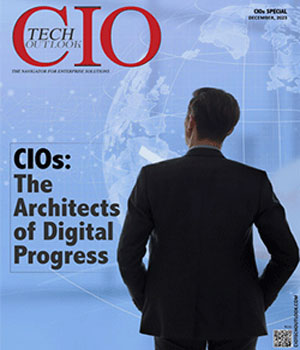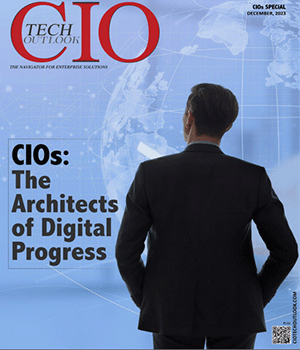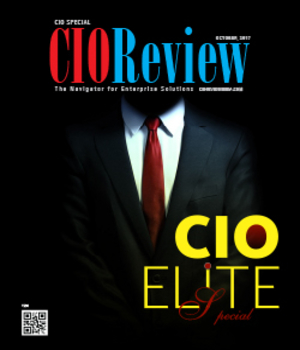
Decoding the CIO's Role in Digital Metamorphosis
Anil Khatri, Head IT (South Asia), SAP India Subcontinent | Thursday, 05 October 2017, 12:31 IST
 Ironic as it may sound, IT infrastructure is no longer the top priority for CIOs. It is a given that we have been driven by hyper-connectivity, computing and a mesh of cyber-led forces for several years now. But with a full digital over haul staring at us compels leadership to now re imagine the full enterprise and not just the IT function. The biggest benefits of this transformation will occur only if the digital on slaught is not only embraced but also directed to renovate the core and end fragility to provide a new foundation that is tuned to the new found ground realities of the ever-changing business landscape.
Ironic as it may sound, IT infrastructure is no longer the top priority for CIOs. It is a given that we have been driven by hyper-connectivity, computing and a mesh of cyber-led forces for several years now. But with a full digital over haul staring at us compels leadership to now re imagine the full enterprise and not just the IT function. The biggest benefits of this transformation will occur only if the digital on slaught is not only embraced but also directed to renovate the core and end fragility to provide a new foundation that is tuned to the new found ground realities of the ever-changing business landscape.
The biggest benefits in the IT department itself will occur when the technologies are directed towards creating new efficiencies and enhancing business productivity. A CIO has a vibrant opportunity to lead to be the fulcrum of this change. According to a recent report by SAP and IBM, 70% of boardrooms expect their CIO to be an innovative force and creative disruptor, who helps unlock new opportunities and identifies challenges to overcome. Are CIOs really preparing to take on this digital disruption? There may be no single response to this debate but there are definitely a few unified priorities that will enable them to do justice to their newly evolved role both in the short term and in the future.
"CIOs have the task to not only impact the efficiency or effectiveness of the organization also to innovate to find new ways for product and service delivery in the digitally exploding world"
CIOs have the task to not only impact the efficiency or effectiveness of the organization also to innovate to find new ways for product and service delivery in the digitally exploding world. They need to proactively shape their firms’ technology roadmaps and deliver measured improvements in creating customer value. Over 70% of leading CIOs nod in agreement to this reality and believe in the strategic importance of adapting new and emerging technologies.
Many CIOs are under pressure because we fall short of experience in successfully achieving such a transformation as this is a dynamically evolving and fairly new phenomenon. What adds to this complexity is the fact that the CIO has to wrestle other stakeholders in the C-Suite, namely the chief digital officer (CDO), and perhaps even the chief marketing officer (CMO)to play top dog in driving digital initiatives.
We have no option but to break away from our existing business model to give shape to and embrace a fundamentally new model that is digital-first in all aspects. This will require re-engineering of processes and a robust change management program. This will give rise to the need for complete new skills that we would have never expected to expect from a CIO a few years ago:
• Visionary: Day-to-day business demands often make it challenging to stay focused on shaping the future and delivering an ambitious but motivating target picture. Since digital technology will play the driver’s role now more than ever, the CIO will be at the core as well – whether or not he or she wants it Data alchemist: Sure, the alchemists tried unsuccessfully to convert base metals into gold, but they also laid the foundation for modern chemistry! Today, we need CIOs to partner their business counterparts to build capabilities that will transform traditional activities and concepts such as forecasting, demand anticipation, customer lifetime value and decision making purely because of the availability of data and insights that can be drawn from it.
• Entrepreneur: CIOs need to be risk takers and place bets on the digital future, which is changing rapidly. They need to play true innovators can drive new use cases and business models, which are traits very similar to what inspires entrepreneurship
• Transformer: Everyone talks about digital transformation, but few know how to lead it. A tailored digital transformation framework is required to systematically drive the deltas between the status quo and the desired digital end state. The CIO must construct a specific company framework that will help them win and is also tasked with the responsibility to align with C-level colleagues and help them navigate this transformational change.
In summary, a CIO’s responsibility is to continuously drive platform innovation and renovate the core and anticipate the next wave of digital. Internally, an agile and nimble organization ready to adapt to change is critical as well and the CIO has to emerge as the flag bearer here as well as this change will have digital at its core. The myth of being ‘future proof’ is busted forever with the coming of the digital tsunami.
CIO Viewpoint
Hyper-Converged Infrastructure: The Next Big...
By Amit Jaokar, EVP - IT, Choice International
Embracing Technology: Need of the Hour in BFSI
By Nikhil Bandi, SVP & CIO, Vistaar Financial Services
Three Pronged Approach For Digitization In Life...
By Ekhlaque Bari, EVP & Head Technology - Max Life Insurance
CXO Insights
A Glimpse of A Changed AI Perspective in India
By Dr. Vijay Srinivas Agneeswaran, Senior Director of Technology, Sapient
Social Networking and the Enterprise
By Arindam Sen, SVP, Schneider Electric
Digital Transformation - Darwinism Or Dwarfism?









